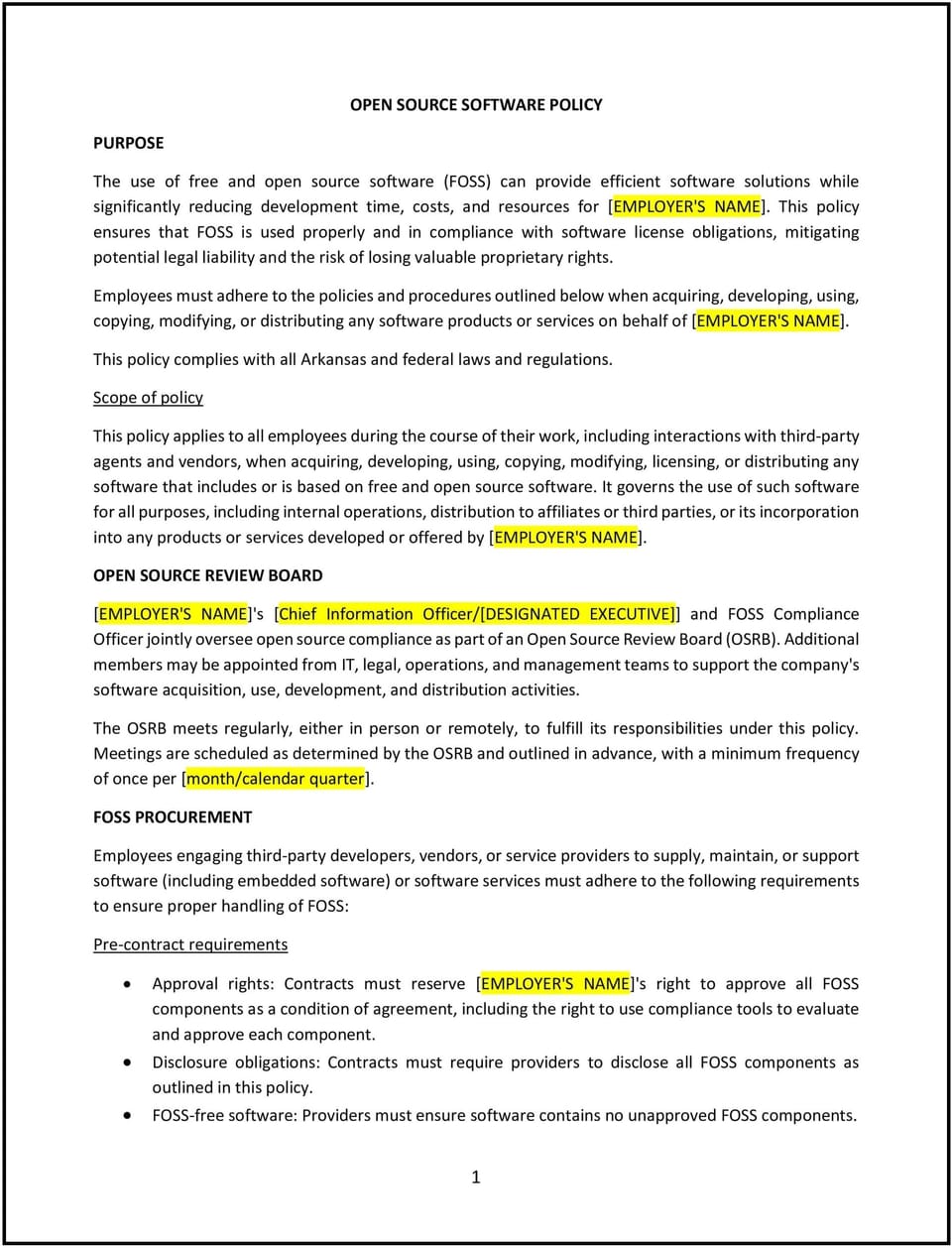Open source software policy (Arkansas): Free template

Open source software policy (Arkansas)
In Arkansas, an open source software (OSS) policy provides businesses with guidelines for using, contributing to, and distributing open source software within their operations. This policy helps businesses manage legal, security, and compliance risks while promoting innovation and efficiency through OSS usage.
This policy outlines the process for evaluating, approving, and managing OSS in business operations. By implementing this policy, Arkansas businesses can harness the benefits of open source software while safeguarding intellectual property and supporting compliance with applicable laws.
How to use this open source software policy (Arkansas)
- Define acceptable use: Clearly state how open source software can be used in business operations, including acceptable licenses and restrictions.
- Establish approval processes: Require employees to obtain prior approval before using or contributing to OSS in business projects.
- Address compliance requirements: Outline procedures for ensuring compliance with OSS licenses, such as attribution, documentation, or distribution obligations.
- Mitigate risks: Include security protocols for evaluating OSS before implementation, such as code reviews or vulnerability scans.
- Provide training: Educate employees on the risks and responsibilities associated with using open source software in the business.
Benefits of using this open source software policy (Arkansas)
This policy offers several advantages for Arkansas businesses:
- Promotes innovation: Encourages the use of OSS to develop cost-effective and scalable solutions for business operations.
- Protects intellectual property: Ensures OSS usage does not inadvertently expose the business’s proprietary assets or violate license terms.
- Supports compliance: Aligns with Arkansas-specific laws and federal regulations, reducing the risk of legal or financial liabilities.
- Enhances security: Implements safeguards to identify and mitigate vulnerabilities in open source software.
- Standardizes practices: Provides a consistent approach to managing OSS, reducing risks and improving operational efficiency.
Tips for using this open source software policy (Arkansas)
- Address Arkansas-specific considerations: Incorporate any state-specific legal requirements or industry practices related to software usage.
- Conduct regular audits: Periodically review OSS usage to ensure compliance with licenses and identify any risks or vulnerabilities.
- Collaborate with legal experts: Work with legal counsel to interpret and manage complex OSS licenses, ensuring proper usage and distribution.
- Document contributions: Maintain detailed records of all OSS contributions by employees to avoid intellectual property disputes.
- Update the policy regularly: Reflect changes in technology, OSS licenses, or business needs by revising the policy as required.
Q: How does this policy benefit the business?
A: This policy ensures the secure and compliant use of open source software, protects the business’s intellectual property, and promotes innovation through cost-effective solutions.
Q: What steps should the business take to approve open source software usage?
A: The business should evaluate the software’s license, conduct a security review, and document its intended use to ensure compliance and mitigate risks.
Q: What measures can the business take to mitigate security risks from OSS?
A: The business can implement regular vulnerability scans, perform code reviews, and monitor OSS updates to address potential security concerns.
Q: How can the business manage contributions to open source projects?
A: The business should document employee contributions, review potential intellectual property implications, and ensure compliance with the project’s licensing terms.
This article contains general legal information and does not contain legal advice. Cobrief is not a law firm or a substitute for an attorney or law firm. The law is complex and changes often. For legal advice, please ask a lawyer.


